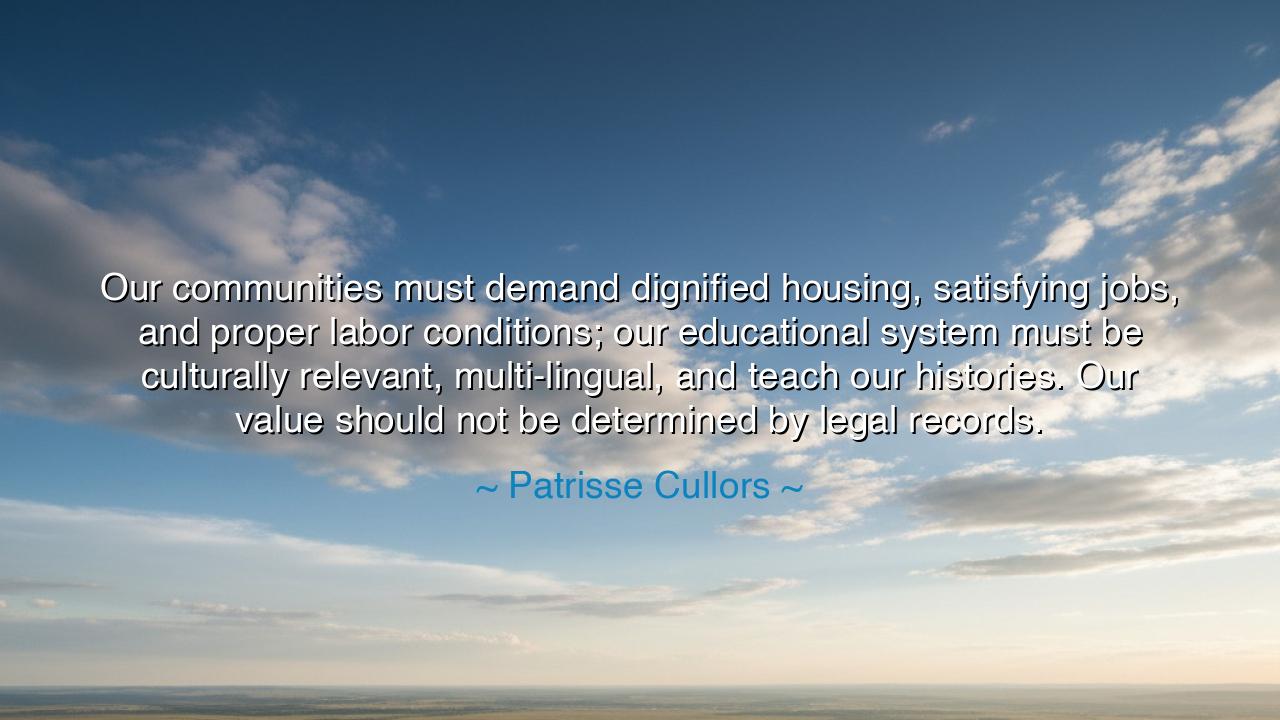
Our communities must demand dignified housing, satisfying jobs
Our communities must demand dignified housing, satisfying jobs, and proper labor conditions; our educational system must be culturally relevant, multi-lingual, and teach our histories. Our value should not be determined by legal records.






Hear the fervent cry of Patrisse Cullors, co-founder of a movement born from anguish yet fueled by hope, who proclaimed: “Our communities must demand dignified housing, satisfying jobs, and proper labor conditions; our educational system must be culturally relevant, multi-lingual, and teach our histories. Our value should not be determined by legal records.” These words are not mere rhetoric, but a call to the heart of justice itself, a summons to recognize the sacred dignity of every person, regardless of their station, their past, or the burdens of a system that has often failed them.
The origin of this saying is rooted in Cullors’ lifelong struggle against mass incarceration, systemic racism, and the cycles of poverty that bind so many communities of color. Having grown up in Los Angeles, in neighborhoods scarred by poverty and policing, she understood that the structures of society too often judged people not by their humanity but by their legal records. In her words, she reclaims the truth: that worth is not defined by papers or prisons, but by the divine spark in every soul.
Her demand for dignified housing recalls one of the oldest lessons of civilization: that without shelter, human life cannot flourish. In ancient Rome, the great statesman Cicero warned that a city without care for its poor was doomed to unrest. In more recent history, we see this lesson in the cries of tenement dwellers in New York at the turn of the 20th century, who lived in overcrowded, filthy conditions until reformers demanded laws for sanitation and safety. Housing is not a luxury, but the foundation of dignity.
The call for satisfying jobs and proper labor conditions echoes across the centuries as well. Recall the coal miners of West Virginia, who in the early 1900s labored in dangerous shafts, earning pennies while corporations reaped fortunes. They rose in strikes, facing violence and persecution, yet their sacrifice paved the way for labor rights that endure today. Cullors’ words remind us that these battles are never finished. For where labor is exploited, humanity is diminished, and where work is meaningful and fair, dignity thrives.
The vision for an educational system that is culturally relevant and multi-lingual is equally profound. For too long, history has been told from the vantage of the conqueror, leaving silenced the voices of the oppressed. Think of the Native American children torn from their families, forced into boarding schools that stripped them of language and culture. Such education did not teach truth; it imposed erasure. To demand an education that teaches our histories is to reclaim identity, to tell the story of the people in their fullness, so that future generations may walk in truth rather than in shadows.
Most radical, perhaps, is her declaration that our value should not be measured by legal records. For the law, though clothed in authority, has often been used as an instrument of oppression. The fugitive slave laws once condemned men and women to chains for the simple act of seeking freedom. Jim Crow statutes marked millions as lesser beings. Even today, a criminal record, however small, can brand a person for life, barring them from work, housing, and opportunity. Cullors proclaims a higher law: that human worth cannot be reduced to the ink upon legal parchment.
The lesson, O listener, is urgent and clear. A just society does not measure men and women by their scars, but by their capacity to heal and to contribute. It does not reduce human worth to the mistakes of the past or to the judgments of an unjust system. Instead, it builds communities where people may live in dignity, labor with fairness, learn with truth, and rise with hope.
And what shall we do in our own lives? Support policies that expand affordable housing, fair labor practices, and equitable education. Reject the instinct to define others by their legal records, and instead seek to see the humanity beyond the label. Listen to the voices of the marginalized, not with pity but with respect. And in our own speech, teach our children and our neighbors that value is inherent, not earned by conformity to unjust systems.
So remember the teaching of Patrisse Cullors: demand dignified housing, demand satisfying jobs, demand education rooted in truth, and never allow the worth of a human being to be bound by their legal records. For when we honor these truths, we do more than reform a system—we restore the very soul of our communities.






AAdministratorAdministrator
Welcome, honored guests. Please leave a comment, we will respond soon